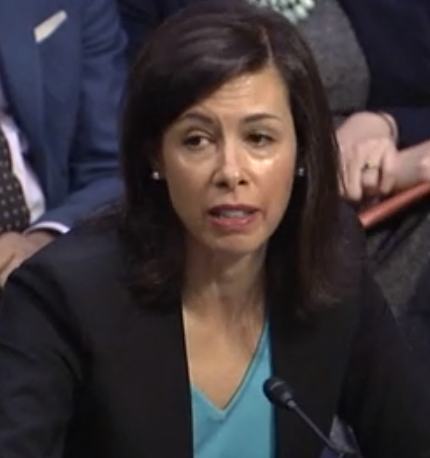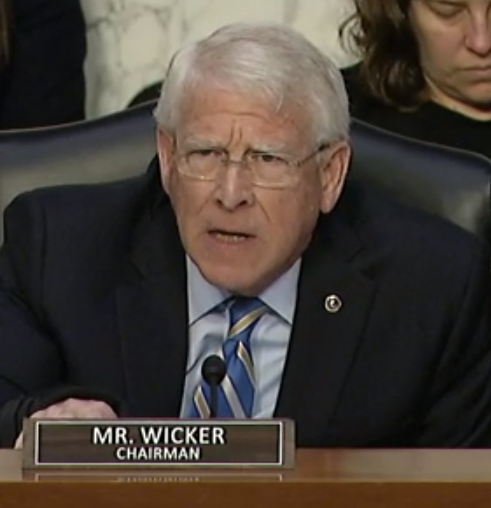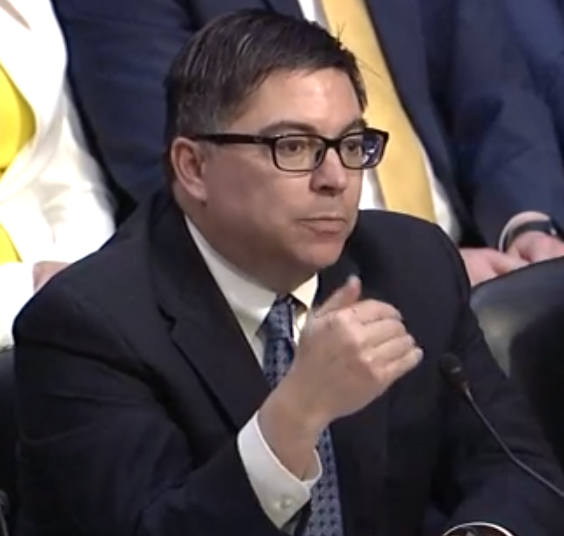Hill Talks C-Band, 5G at Tech Future Hearing
The smarter way to stay on top of the multichannel video marketplace. Sign up below.
You are now subscribed
Your newsletter sign-up was successful
Democratic FCC commissioner Jessica Rosenworcel said the 5G hype machine is in full force, though there is agreement that next-gen wireless will indeed be the network of the future.
Related: Future Tech Funding Bill Introduced
That came in the Senate Commerce Committee's first hearing of the new year, entitled "Industries of the Future" and dealing with the federal government's role in advancing new technologies.
Also testifying was Republican commissioner Michael O'Rielly, who joined with Rosenworcel in saying it was important on freeing up C-Band (midband) spectrum for 5G ASAP. But O'Rielly said the priority was speed, while Rosenworcel said it should be "getting it right." O'Rielly has argued that getting it fast and getting it right are not mutually exclusive.

On the issue of speeding the 5G rollout, Sen. Roger Wicker (R-Ohio), chairman of the Senate Commerce Committee, pointed out that there is "a company on TV" already advertising that they are already leading the industry in 5G.
Rosenworcel said there have been some deployments, which was exciting, but that they were chiefly in urban areas. But she said that, overall, there were more deployments in countries like Switzerland, and far more in China.
She said most of the world had seen U.S. leadership in 4G and decided they wanted to do that this time around.
The smarter way to stay on top of the multichannel video marketplace. Sign up below.
Related: Senate Commerce Approves C-Band Auction Bill
Rosenworcel carried her criticism of what she said was the FCC's focus on high-band spectrum to the witness table. She said the U.S. was alone in focusing on auctioning high-band early on, which she said was only good for urban America, not rural. She said the FCC needs to pivot to midband.
Wicker asked if the FCC commissioners agreed on the need for that pivot. She said the committee could help get it there by coming up with legislation to chart out the best way forward on 5G spectrum.

Wicker said the committee would certainly want to be heard from on where the money from those spectrum auctions go. But he asked FCC O'Rielly, who was also a witness at the hearing, for advice on the quickest way to get spectrum for 5G.
O'Rielly said he was definitely on the same page with Rosenworcel when it came to wanting 5G spectrum freed up quickly, and associated himself with her remarks on some of the advancements in other countries. But he did not say that meant the U.S. is behind. He called it an active race whose winner is yet to be determined.

In terms of, say, the C-Band auction, which is the spectrum Rosenworcel would like to see the FCC prioritize clearing, O'Rielly said he was willing to trade "some of the ideals that people would have liked otherwise" in order to speed its clearing.
He said that was why he felt the satellite providers giving up the spectrum must be compensated to avoid protracted litigation. "Trying to take that from them would be an aggressive action by the commission."
Rosenworcel said legislation was needed to clarify the FCC's practice of reclaiming spectrum and to direct where the billions of dollars in proceeds should be directed. Satellite companies have argued the FCC does not have the authority to simply take the spectrum without compensating them for it.
But some in Congress, on both sides of the aisle, are concerned that paying satellite operator incumbents, all international companies, would be taking money that could instead be spent on things like public safety and rural broadband.
Wicker said Congress had noted it could be a great deal of money, but asked about the litigation risk O'Rielly was talking about.
Rosenworcel said legislation could help prevent litigation. O'Rielly said he welcomed litigation, but absent that he said the FCC needs to address the issue and act.
Wicker asked whether there would have to be legislation early this year, O'Rielly said absolutely.
Ranking member Maria Cantwell (D-Wash.) said she did not want the to turn into a proxy discussion about how much to pay foreign satellite companies for the spectrum. Chiefly because she said the law is clear that they don't own the spectrum.
And while Wicker appeared to align himself with O'Rielly's need for speed, Cantwell said: "I'm with you Ms. Rosenworcel, let's get it right."
Contributing editor John Eggerton has been an editor and/or writer on media regulation, legislation and policy for over four decades, including covering the FCC, FTC, Congress, the major media trade associations, and the federal courts. In addition to Multichannel News and Broadcasting + Cable, his work has appeared in Radio World, TV Technology, TV Fax, This Week in Consumer Electronics, Variety and the Encyclopedia Britannica.

